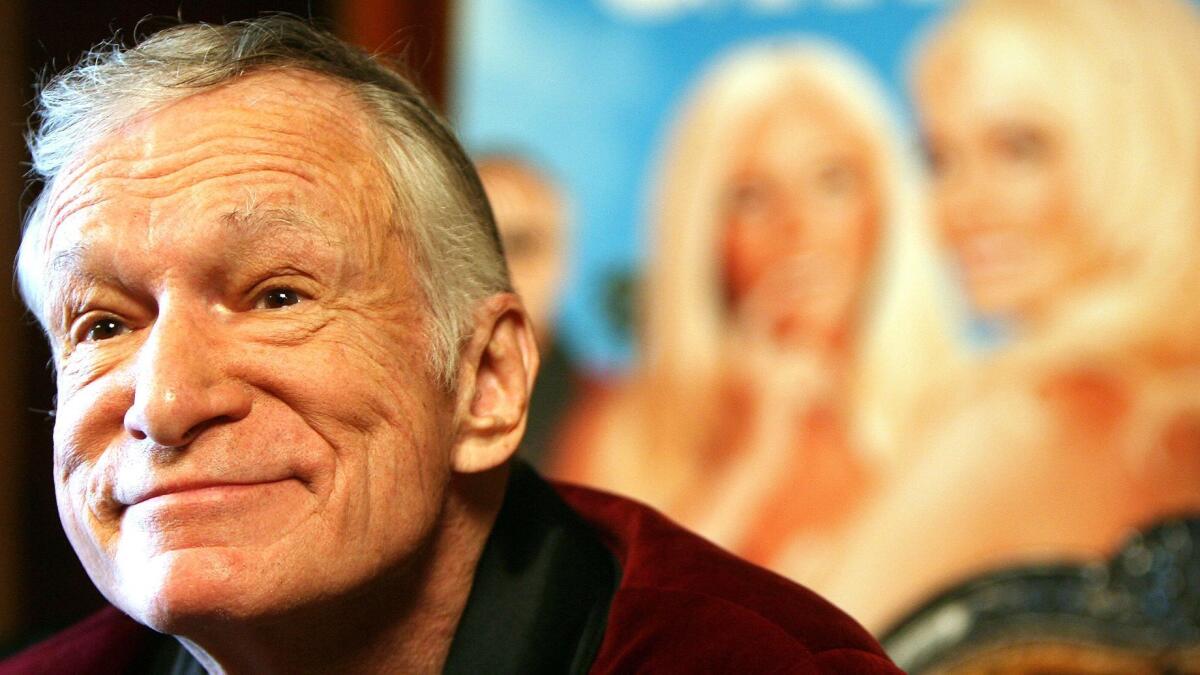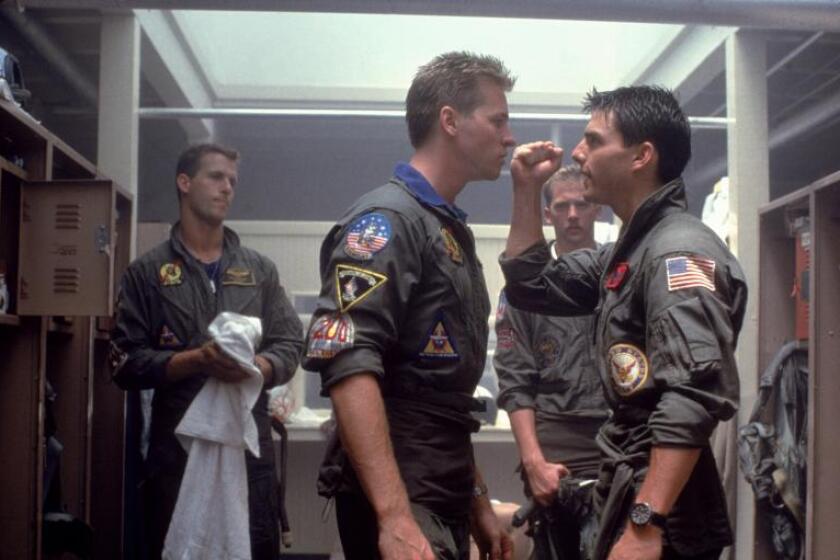From the Archives: Hugh Hefner: The bunny man

- Share via
I’ve been in this room in the Playboy Mansion before.
As I recall, the painting on the wall was a topless portrait of his wife, Kimberley, mother of his two teenage sons, from whom he is now separated. Now it’s just Hefner, painted in Tudor robes, in the style of Holbein.
In person, he wears his singular uniform of pajamas and slippers. The girls cavorting outside have changed, but he has not. At 83, he is part of the 20th century cultural pantheon, the subject of “ Hugh Hefner: Playboy Activist and Rebel,” an in-the-works documentary by an Oscar-winning filmmaker. He remains “creative director” of the family business, Playboy Enterprises (his daughter, Christie, stepped down as chief executive in December). A cable TV show about life with his trio of blondined girlfriends has made him more famous now than he was as the renowned and sometimes notorious founder of Playboy, which, compared with some 21st century smut, is practically decorous.
The man who put the “he” in “hedonism” says he’s proud of liberating women as well as men from the sexual cage of the 1950s.
In Steven Watts’ biography, “Mr. Playboy,” he says you had a bunny blanket when you were little, and it inspired the Playboy bunny motif. Was that blanket your “Citizen Kane” Rosebud?
Rosebud, yes, absolutely! Unreal, but true. Had to burn it because of a dog. [He used it to cover a sick, stray dog.]
You had a part in the film “Miss March,” but it seems like you’re always acting. Are you always “on”?
No, but through a lifetime you reinvent who you are. I actually reinvented myself the first time when I was 16, when a girl rejected me. I started referring to myself as Hef, started changing my wardrobe -- the same thing I did in 1959-60 with the magazine, when I came out from behind the desk and started living the life and got the first Playboy mansion, started to drive a Mercedes 300SL, started living the life.
Don’t you ever want to be with a woman near your own age, to whom you could say things like, “Boy, remember the stink when Truman fired MacArthur?”
I find that in male friends. I look for something else in female companionship. My taste in women has never really changed. It’s the fantasies I had that came right out of the movies in the 1930s. I think it was Alice Faye and the female lead in the “Flash Gordon” serial who had a big impact on me when I was 10. The only sexy serial ever produced. My buddies and I, on Manly Monday nights -- we just finished watching it again.
You’ve had such an influence on defining modern ideas of beauty. When I asked friends what they’d like to tell you, several said, “He made me feel bad because I didn’t look like that.”
[A bit taken aback] Well, that’s a very unique notion. How about guys who read Sports Illustrated and feel as if they can’t break records in terms of sports?
That’s the equivalent?
Of course. In other words, what are dreams and fantasies all about? Aspirational. ... The major message in terms of the centerfold and Playboy isn’t simply beauty. The major message is a more liberating attitude toward sexuality.
I don’t see a pierced ear or a tattoo. Didn’t you have a midlife crisis?
I don’t think so. Frankly, I never lost connection with my childhood. That’s who I am. If you go into my bedroom you’ll see all manner of things directly connected to it. You’ll see a bust of Frankenstein, you’ll see “The Shadow,” you’ll see “The Maltese Falcon,” you’ll see a framed rocket gun from Buck Rogers.
So are you kind of a nerd?
I don’t think that’s nerdy. I think that’s holding on to your childhood dreams. I think the best of who we are is who we were when we were kids and dreamed those dreams.
For the first time in a long time, there’s no Hefner running Playboy. Is this something you want your sons to consider?
Yes. One of them is in college and the other’s about to go to college. I think they’re both interested.
Did you have the birds and the bees talk with them?
I think they pretty much grew up in an adult world. It wasn’t like it was with me, when it was a revelation when I discovered where babies came from. We don’t live in that kind of a world any more.
What’s your sense of where Playboy is going, both the print component and the skin component?
I think that the future is clearly more electronic. I’m a print guy, and I hate the fact that people have less interest in reading. So I care about that, but I think in reality the very nature of communication has changed.
Do you ever want time alone in bed just to read?
I read, but I usually read in bed with a girlfriend there.
Do you ever mix them up, call them by the wrong names?
Sure ... I’m notorious for that.
Do you ever worry that these women are just after you for your body?
Not for a moment. Why would I? Who cares?
Then, what is the quid pro quo?
Well, I have thought long and hard about that, as a matter of fact. I think that just as [ Henry] Kissinger said, power is the ultimate aphrodisiac. Celebrity is the ultimate aphrodisiac in today’s world. And I’m lucky enough to have fallen into a unique kind of celebrity. So against all logic, nothing else matters -- age doesn’t matter. When [my last long-term] relationship ended, last year, they were climbing over the gate.
They?
Young women. Endless numbers of young women.
What’s your advice on how to break up?
That’s an unusual question -- I would have expected the question to be how to hook up. I think the best way in any of that is honesty. I’ve remained close friends with almost every major romantic relationship of my life and feel very badly for people who lose that connection.
Have there been any downsides to the advances in this country in the last half-century?
With every advance you lose something. The music was much better when I was growing up, the movies were consistently better, the whole pop culture was better. I feel sorry for people who grow up and then when they’re a little older look back and say, “Oh, listen, they’re playing our song: ‘Why Don’t We Do It in the Road?’”
You’ve just turned 83. If you were writing the last line of Watts’ book, what would it read?
That I played some positive part in changing the social-sexual values of the time. I think that’s what belongs on the tombstone.
patt.morrison@latimes.com
More to Read
Start your day right
Sign up for Essential California for the L.A. Times biggest news, features and recommendations in your inbox six days a week.
You may occasionally receive promotional content from the Los Angeles Times.








